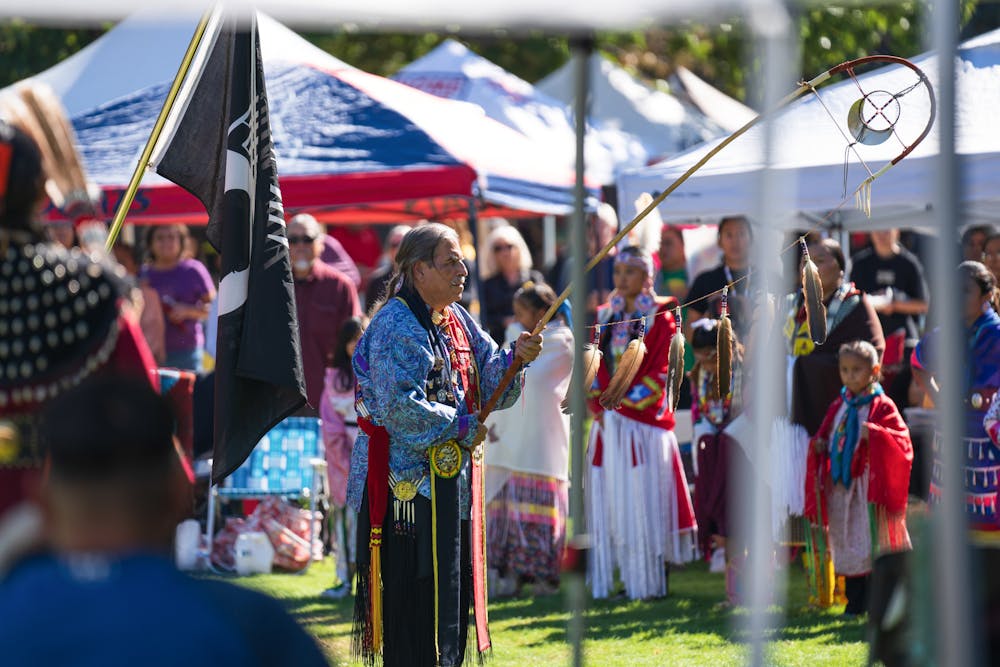The rhythmic thuds of drums and the jingles of bells filled the air as performers, decked in colorful, eye-catching regalia, gathered to pay tribute to their ancestors' traditions. For National Native American Heritage Month, ASU hosted a Native American Heritage Festival Pow Wow on Nov. 9.
Powwows are celebrations for various nations of Indigenous people to come together and honor past traditions. The word powwow is derived from Pau Wau which translates to "medicine man" in Narrtick, an Algonquian language.
Dwayne Joe, a community member who attended the event, said powwows are a safe place for Indigenous folks and are "a place for education."
The vibrant gatherings are filled with sacred drumming, dancing and singing. Along with entertainment the celebrations offer handmade crafts and traditional foods for all to enjoy. These festivals allow Indigenous communities to reconnect, see relatives or friends and continue heritage preservation.
Gabriel Anderson attended the powwow as a dancer in the northern men's traditional category. Anderson said the dancers wore a modernized version of the regalia once worn by warriors, which includes a breastplate, shields, dance bells and beadwork.
Anderson's father was a dancer who passed on the tradition to Anderson and showed a way the Indigenous community can express their identity with self-empowerment, Anderson said.
Some of the older dancers who attended the powwow grew up in a time where it was illegal to partake in Indigenous ceremonial practices, Anderson said. It was not until the American Indian Religious Freedom Act that legalized traditional Native American religions and ceremonies in 1978.
"It's important that we keep it preserved because these roots are what keep us strong," Anderson said. "It's what's kept us alive through everything that's happened to us."
Indigenous peoples highlight their resilience at powwows and demonstrate the desire and passion at these events.
ASU has hosted powwows for everyone for over 20 years, inviting not only Native American students but also the community surrounding the University.
Randii Lantz Castaneda, who was Miss Indigenous at ASU, 1st Attendant 2024-2025, has attended various powwows and is a member of the Alliance of Indigenous Peoples. Castaneda also studies art, anthropology and American Indian studies.
Castaneda said it's important to have these events on the West Valley campus and not exclusively in Tempe to reach a broader audience. Castaneda said they would like to see more non-Indigenous people at these events to help create an environment where everyone feels welcome.
Leilani Lee is not an ASU student but attends the annual powwows to show support for the vendors and dancers. She said she recognizes that many schools do not actively advocate for Native American communities, but credits ASU for hosting events that are open to the Indigenous community beyond the University.
ASU's yearly powwow created a place where students and community members of all ages and backgrounds can come together to commemorate Indigenous heritage. But powwows are more than just performances, they also honor artists and vendors, giving them an opportunity to showcase and sell their crafts.
Michaelene Johnson attended the event and has helped sell jewelry with family at past ASU powwows under the business name Southwest Indian Jewelry.
Powwows create a space for supporting these artists, since many of the items sold are unique, handmade and typically not available in mainstream stores.
"You don't find a lot of this stuff in retail, so it's nice to see people still doing this — making jewelry, making shirts, things like that, that we can't buy in stores," Johnson said.
Powwows are rich celebrations of Indigenous culture that foster vital spaces for connection, education, and preservation. Celebrating powwows ensures that Indigenous traditions, long suppressed and nearly lost, continue to flourish in modern-day communities.
Edited by Senna James, Sophia Ramirez, Tiya Talwar and Madeline Schmitke.
Reach the reporter at nrodri74@asu.edu.
Like The State Press on Facebook and follow @statepress on X.
Natalia is a sophomore studying journalism and mass communication with a minor in creative writing. This is her second semester at The State Press.




